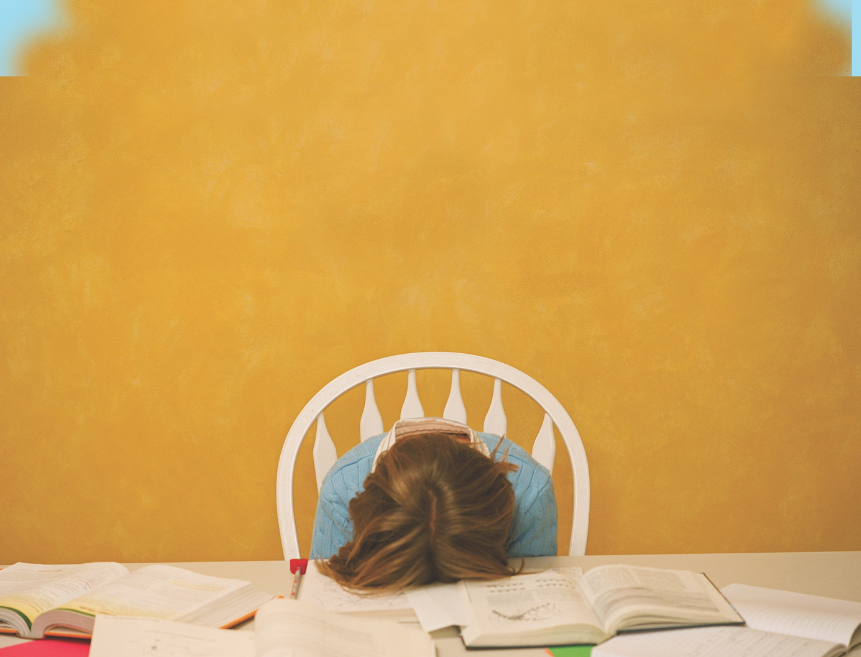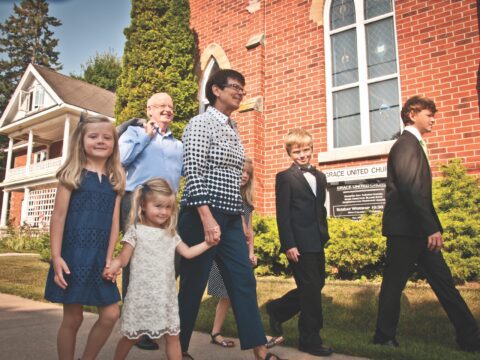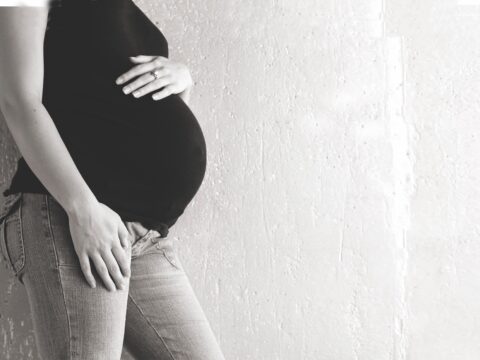When Emily Dickson’s* 15-year-old son Dylan brought home a D in science after his first semester in Grade 9, the Toronto mom was determined he wouldn’t fail another science test. And so began their nightly battles over homework. Dylan would fidget at the table under her watchful eye, but it didn’t do much to improve his marks. She took away his video games and then stopped paying for his guitar lessons. (“That was dumb because I was punishing myself more than him because I loved the fact that he played guitar.”) Often there were raised voices and tears. “Finally I gave up the fight because my relationship with my son had become so eroded over this,” she says.
Dickson told her son it was up to him whether he passed or failed. “At first it felt risky — like I was abandoning him and shirking my motherly responsibility.” But for the rest of the school year, she bit her tongue and did not ask Dylan about his science homework. He managed to squeak by with 62 percent in Grade 9 science and even started to like the subject. “What this experience taught me is that we are separate from our children,” Dickson says. “Their failures or successes aren’t ours. They have to be able to make it on their own.”
Parents like Dickson aren’t alone in wanting to protect their kids from failure. Schools do it too by passing kids to the next grade level even though they get failing marks or by not penalizing kids who cheat. The problem extends to the playing field, where every kid gets a trophy, even the ones who don’t show up for practice. And it continues in university, where parents stay up until the wee hours honing their grown children’s papers to “help” them get the best mark possible.
At every step along the way, we try to shield our kids from failure. But in doing so, we’re robbing them of the opportunity to develop the resilience they’ll need to handle the challenges that life will surely throw them.
“If everybody gets a gold star and a passing grade, what we get is an inflated culture,” says Carl Honoré, a Canadian journalist living in London, England, and the author of Under Pressure: Rescuing Our Children from the Culture of Hyper-Parenting.
The result, he warns, is a generation of “mollycoddled” kids who don’t learn how to take a knock. “If you sail through childhood completely insulated, when you come out the other side and have to stand on your own two feet, you won’t be able to make it,” he says. And if these infantilized adults end up living in our basements well into their 30s, well, we may have no one but ourselves to blame.
Honoré argues that the rise of globalization has brought more competition and uncertainty to the workplace — making parents more anxious about equipping their kids for adult life. “The net effect is to create a culture of soaring expectations. . . . As parents, we feel immense pressure to give our children the best of everything and make them the best at everything — to give them a ‘perfect’ childhood.”
In our eagerness to smooth the pathway for our kids, we raise them with a child-rearing philosophy that’s all about building their self-esteem: we ooh and ah over their preschool art projects as if they were the work of Michelangelo himself, brag about their “giftedness” and constantly reinforce the message that they are great at everything they do. But this kind of over-praise can actually backfire and make kids unable to accurately assess their talents and abilities, says Toronto psychologist Alex Russell, author of the upcoming book Drop the Worry Ball: How to Parent in the Age of Entitlement. “Praise can actually be controlling and patronizing, and it can detract from what the child is trying to accomplish. What kids really need from their parents is recognition and validation — that’s what gives them a sense of mastery and competence.”
Nancy Bryans, a 51-year-old mother of three kids in Hamilton, says her well-meaning mother showered her with so much praise when she was growing up that she wasn’t prepared for the reality that the rest of the world might not admire her in the same way. “She constantly told me how wonderful I was and always offered lots of praise. When I left home, there was no one saying those kinds of things to me on a daily basis. I think this made me needy at times for accolades for the simple victories in my life.”
Parents over-praise and overprotect their kids because they can’t bear the thought of anything bad ever happening to them, explains Russell. “Parents forget that kids aren’t missing the part of the brain that allows them to be anxious on their own behalf. When we don’t do the worrying for them, they are forced to do it themselves.” He says educators and parents are “increasingly frustrated at having to deal with kids who are disrespectful, entitled and unappreciative,” and he laments what he views as an “epidemic of disengaged kids.”
Part of the solution, says Russell, is for parents to stop being excessively involved and to take more of an “interested bystander approach” when raising their kids. If the children forget their lunch, don’t drive it to school — let them go hungry for a day, and they’ll remember it next time. If they don’t do their homework, don’t nag them — let them deal with the consequences with the teacher. Don’t call the coach if they don’t make the team — encourage them to find another sport instead. “Kids need to experience painful non-catastrophic failure,” he says, so that they can learn to do better the next time.
Christina Paradela, a diaconal minister at Trinity United in Grimsby, Ont., says she tried hard to allow her teenage daughter to face failure — without stepping in to save her and without hectoring her for her mistakes. “I remember when she was in Grade 11 and started experimenting with drinking. A few times she got drunk, and I’d be holding her hair while she threw up in the toilet. I didn’t get mad. Instead I’d say things like, ‘Wouldn’t it be better to drink less so you don’t get to this point?’” Today her daughter is studying psychology at the University of Guelph, and “when she does drink, she does it responsibly,” says her mother. “She learned the lesson she needed to learn.”
Honoré argues that “failure is the crucible in which you forge a meaningful character.” And if we hope to raise kids with character, they may need to stumble a little along life’s way. “Anyone who has ever solved a problem or broken new ground will say that failure is part of the equation,” says Honoré. “Failure stops you in your tracks, knocks you off balance, twists your view and rotates the world so you can see things from a fresh angle. That’s what allows you to come up with new ideas, to be creative and inventive.”
*Name has been changed
***
This story first appeared in The United Church Observer’s February 2012 issue with the title “Without fail.”














